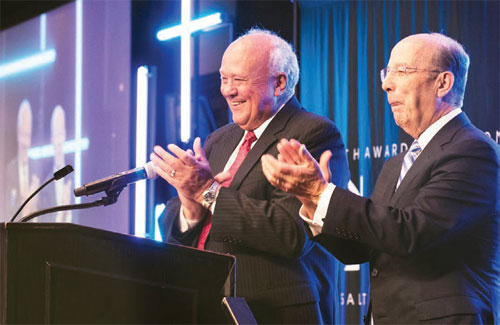By Brice Wallace
The leaders of “Utah’s Voice of Business” want more voices to be part of their chorus.
During the Salt Lake Chamber’s annual meeting in Salt Lake City, they encouraged more involvement in chamber programs and with efforts to address issues confronting the state’s economy.
“By getting involved, we can solve our state’s challenges, maintain our state’s robust economy and ensure our state’s future,” Lane Beattie, the organization’s president and chief executive officer, told the crowd. “It’s imperative that we continue to have an engaged, vocal and active business community.”
{mprestriction ids="1,3"}Beattie cited as an example the next legislative general session, in which the business community can weigh in on several big issues. “There’s going to be a lot of heavy lifting this next legislative session as we push for tax reform, education funding and modernization of transportation policy,” he said. “Our engagement is critical to our continued success.”
Wilford Clyde, the new chairman of the chamber’s Board of Governors and chairman and chief executive officer at Clyde Companies, urged chamber members to get involved with educational institutions to help address workforce issues facing the state. Many companies in Utah have said they cannot find enough skilled workers for open positions.
“The time for complaining about our workforce is over,” Clyde said. “Now it’s time to think about how we’re going to help solve it. It’s time for business leaders to engage and get on advisory boards and help build our labor supply. There’s even an opportunity for your employees to get involved in these efforts by working with students, teachers and administrators and contributing to working-based learning opportunities, like the STEM Mentor Exchange program that was unveiled earlier this year.”
Businesses also need to help “bridge the rural/urban economic divide,” as he described it, noting that many Wasatch Front companies cannot find enough workers while people in rural Utah are struggling for employment opportunities.
Participating in various working groups are examples of ways that the business community “can shape Utah’s economy for years to come,” Clyde said.
Beattie listed several challenges that need to be addressed, including workforce needs, modernization of the state tax structure, infrastructure improvements, water usage and air quality. For example, the chamber’s new “Water Champions” program, stressing the need for businesses to have smart water-use programs, mimics the “Clean Air Champions” program.
“These corporate responsibility programs prove that by working together, we truly can find the solutions to meet our business needs and the long-term health and care of the community,” Beattie said.
Strengthening the workforce will include efforts of the chamber’s Prosperity 2020 program, a business-led movement to advance innovation, investment and accountability in Utah’s education system. But Beattie also said the chamber will continue to partner with other workforce programs, like the state’s Talent Ready Utah initiative and the governor’s pushl for 25,000 new jobs in rural Utah over the next four years. Beattie called for companies to get involved with career and technical education improvements, career pathways programs, and college and university advisory boards and councils.
“Partnership with education and businesses has proven to be a major success,” Beattie said. “To drive better workforce outcomes, the Utah business community must continue to engage. Education needs more industry partners at the table, because without your support for education and workforce, the problem that you’re going to have [is that] improvements will simply not be possible.”
Celebrating 130 years, the chamber includes more than 8,000 businesses statewide, which have a combined employee count of more than 500,000. The chamber has members in 17 states and 29 nations.
Beattie said the chamber’s presence has never been more powerful or impactful. “As you look at the accomplishments of the chamber and what we have done and the policy issues that we addressed and looking toward the future and what really makes a difference in this state,” he said, “we are very, very proud of that.”
The annual meeting also featured presentations of chamber awards. Recipients are:
• Corporate Partner of the Year: Rio Tinto.
• Small Business of the Year: Kaddas Enterprises Inc.
• Community Partner of the Year: Utah Clean Air Partnership (UCAIR).
• President’s Award for Excellence: Tom Guinney, owner, president and chief executive officer of Gastronomy.
• Chamber Champions: Andrew Croshaw, Leavitt Partners; Jim Crowder, Enterprise Holdings Inc.; Brian Garrett, Zions Bank; Brent Lange, Hale Centre Theatre; Natalie Peay, Webb; and Jody Williams, Holland & Hart LLP.{/mprestriction}








